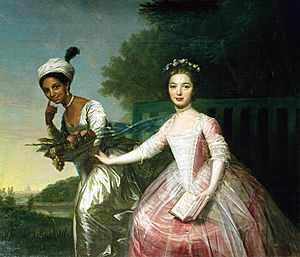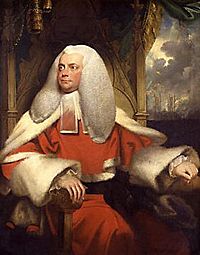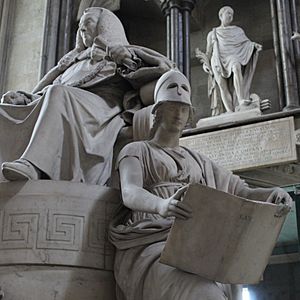William Murray, 1st Earl of Mansfield facts for kids
Quick facts for kids
The Earl of Mansfield
|
|
|---|---|
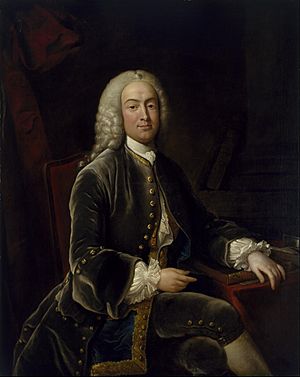
Portrait of Mansfield by Jean-Baptiste van Loo
|
|
| Lord Chief Justice of the King's Bench | |
| In office 8 November 1756 – 4 June 1788 |
|
| Prime Minister | The Duke of Newcastle |
| Preceded by | Sir Dudley Ryder |
| Succeeded by | Lord Kenyon |
| Lord Speaker | |
| In office February 1783 – 23 December 1783 |
|
| Prime Minister | The Duke of Portland |
| Preceded by | The Lord Thurlow as Lord Chancellor |
| Succeeded by | The Lord Thurlow as Lord Chancellor |
| Chancellor of the Exchequer | |
| In office 5 April 1757 – 8 April 1757 |
|
| Prime Minister | The Duke of Newcastle |
| Preceded by | Henry Bilson Legge |
| Succeeded by | Henry Bilson Legge |
| Attorney General for England and Wales | |
| In office 6 March 1754 – 8 November 1756 |
|
| Prime Minister | The Duke of Newcastle |
| Preceded by | Sir Dudley Ryder |
| Succeeded by | Sir Robert Henley |
| Solicitor General for England and Wales | |
| In office 15 December 1742 – 6 March 1754 |
|
| Prime Minister | The Earl of Wilmington |
| Preceded by | Sir John Strange |
| Succeeded by | Sir Richard Lloyd |
| Personal details | |
| Born | 2 March 1705 Scone Palace, Perthshire, Scotland |
| Died | 20 March 1793 (aged 88) Kenwood House |
| Resting place | Westminster Abbey |
| Spouse | Elizabeth Finch |
| Parent | |
| Residence | Kenwood House |
| Alma mater | Christ Church, Oxford |
William Murray, 1st Earl of Mansfield (1705–1793) was an important British judge and politician. He is famous for making big changes to English law. Born into a noble Scottish family, he moved to London at age 13 to study at Westminster School.
He later went to Christ Church, Oxford, and became a barrister in 1730. He quickly became known as a very good lawyer. In 1742, he entered politics as a Member of Parliament and became Solicitor General. He was a great speaker in the House of Commons. In 1756, he became the Lord Chief Justice of the King's Bench, the most powerful judge in Britain.
As Lord Chief Justice, Mansfield helped modernize English law. He improved how courts worked and made legal processes less expensive. He also made important changes to commercial law, which helped Britain become a world leader in trade. He is perhaps best known for his decision in the Somersett's Case in 1772. This ruling said that slavery had no legal basis in England.
Contents
Early Life and Education
William Murray was born on March 2, 1705, at Scone Palace in Perthshire, Scotland. He was the fourth son of the 5th Viscount of Stormont. He was one of eleven children.
He went to Perth Grammar School, where he learned Latin and how to write essays. In 1718, his family sent him to Westminster School in London. This was a long journey of about 400 miles. William did very well at Westminster and became a King's Scholar.
In 1723, he was accepted into Christ Church, Oxford. He scored higher than any other student that year. His family wanted him to become a barrister, like his older brother. A kind supporter, Thomas Foley, gave him money to study law. William joined Lincoln's Inn in 1724 to train as a lawyer.
After King George I died in 1727, William won a competition for a Latin poem. This showed his support for the royal family. He studied history, French, and Roman Law at Oxford. He also became very good at Latin. He earned his degree in 1727 and then moved to London to become a barrister.
Family Life
William Murray married Elizabeth Finch. They did not have any children of their own. They took care of their niece, Lady Elizabeth Murray.
Later, Mansfield's nephew, Captain Sir John Lindsay, brought his daughter, Elizabeth, to live with them. She was born in 1761 and was of half-African descent. She was baptized Dido Elizabeth Belle in 1766. Mansfield raised Dido Belle along with his niece.
Becoming a Barrister
When William Murray moved to London, he met William Hamilton, a Scottish barrister. Hamilton helped him find a place to work and study law. At that time, there wasn't a formal law school. Lawyers learned by reading legal papers and listening to court cases.
Murray studied many legal texts and learned how to write legal documents. He became a barrister on November 23, 1730. He also became friends with the poet Alexander Pope, who taught him about public speaking. This helped him a lot in court.
He started taking cases in 1733. Because he was familiar with both Scottish and English law, he became very good at handling cases from Scotland that went to the House of Lords. This was a special skill after the Acts of Union joined England and Scotland.
In 1737, Murray represented the city of Edinburgh. This was after a riot where the city guard captain, John Porteous, ordered his troops to fire on a crowd. Murray helped reduce the punishment for Edinburgh. For his work, the citizens of Edinburgh gave him the Freedom of the City. His reputation as a brilliant lawyer continued to grow.
In 1738, he married Lady Elizabeth Finch. Her sister was married to the Marquess of Rockingham, which helped Murray's career.
Becoming a Member of Parliament
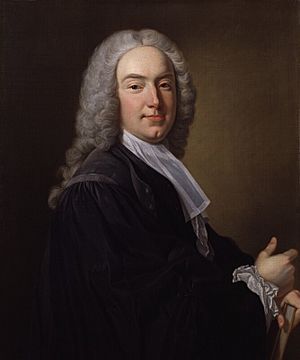
William Murray had often said he wasn't interested in politics. But in 1742, the government changed. His brother-in-law gained political power. Murray then decided to become a Member of Parliament for Boroughbridge. He also became the Solicitor General.
The Solicitor General was a starting legal position in the government. A successful Solicitor General could become Attorney General. From there, they could become Lord Chief Justice of the King's Bench. Murray was a very good Member of Parliament. He was known for his strong speaking skills and clear arguments.
In 1745, he defended the government's decision to hire troops from Hanover during a war. His argument was that the King should decide how to fight a war. This made him popular with the government and King George II. He often spoke for the government in Parliament.
In 1754, the Prime Minister died. The Attorney General, Sir Dudley Ryder, became Lord Chief Justice. Murray then became Attorney General. When Ryder died unexpectedly in 1756, Murray applied to become Lord Chief Justice.
The Prime Minister, the Duke of Newcastle, tried to convince Murray to stay as Attorney General. He offered him more money and a pension. But Murray wanted to be a judge, not a politician. He insisted on becoming Lord Chief Justice and getting a peerage (a noble title). The Duke of Newcastle finally agreed. Murray was happy because he saw politics mainly as a way to become a judge.
Lord Chief Justice
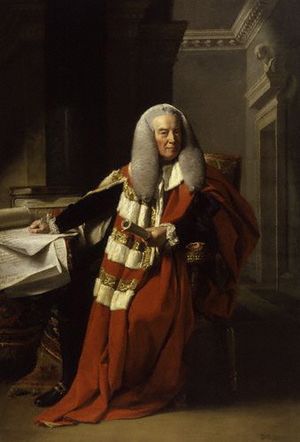
To become a judge, Murray first had to become a Serjeant-at-law. He did this on November 8, 1756. That same evening, he was sworn in as Lord Chief Justice. Soon after, he was given the title Baron Mansfield.
On November 19, he became a Privy Counsellor. For a short time in 1757, he also served as Chancellor of the Exchequer. This was due to an old custom when the position was empty.
Court Reforms
When Mansfield became Lord Chief Justice, he felt that England's legal system was old-fashioned. It was not suited for Britain, which was becoming a major trading country. He immediately began to change how the law and courts worked.
One of his first changes was to how lawyers presented their cases. Before, senior lawyers could present many cases, leaving little time for junior lawyers. Mansfield changed it so lawyers could only present one case a day. This gave junior lawyers a better chance.
He also changed how judgments were given. It was common for judges to delay their decisions. This made court cases more expensive and took more time. Mansfield made it a rule that judgments should be given right away, unless there were doubts about the evidence. This made the courts much more efficient. His changes made the Court of King's Bench very busy and effective.
Commercial Law Changes
In the 1700s, English commercial law was based on old customs. Other European countries had updated their laws, but England was behind. This made it hard for English merchants to do business internationally.
Mansfield worked hard to bring English commercial law up to date. He believed that business rules should be simple and based on common sense. He wanted merchants to be bound by their promises, not just signed documents. This idea was called uberrima fides, or "utmost good faith."
In the case of Carter v Boehm (1766), Mansfield had a chance to apply this idea. A fort governor, Carter, had an insurance policy against his fort being captured. When the French attacked, the insurance company, Boehm, refused to pay. They said Carter knew the fort was weak against European attacks but didn't tell them. Mansfield ruled for Boehm. He said Carter had failed his duty of "utmost good faith." This idea is still used in insurance contracts today.
Mansfield also tried to change the idea of "consideration" in contracts. In English law, a contract usually needs something of value exchanged (consideration) to be valid. Mansfield argued it should just be proof of a contract. However, his idea was later overturned by a higher court.
He also brought back the use of special juries made of merchants for commercial cases. These "Lord Mansfield's jurymen" helped the courts understand business issues better. Mansfield supported free trade and was influenced by Roman law.
In 1783, Mansfield heard the case of Gregson v. Gilbert, about an insurance claim for slaves thrown overboard from a ship (the Zong massacre). He said that slaves were like property, similar to horses. However, new information came out, and he ruled against the ship owners. He wanted to keep maritime insurance law simple.
Copyright Law
Mansfield made an important decision in the case of Millar v Taylor (1769) about copyright law. A bookseller, Andrew Millar, had publishing rights to a poem. After the legal copyright period ended, another publisher, Robert Taylor, started printing the poem.
Mansfield ruled that there was a permanent copyright under common law. This meant that works could never truly enter the public domain. This was a big win for booksellers and publishers. However, this decision was later overturned by the House of Lords in 1774.
Mansfield's judgment has been criticized for not seeing the bigger picture. It would have created a monopoly for publishers. This was one of the few times Mansfield's decisions were overturned.
Somersett's Case and Slavery
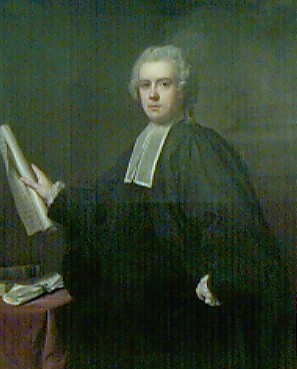
Mansfield is most famous for his judgment in Somersett's Case in 1772. This case was about whether it was legal to keep slaves in England. By 1768, British ships carried more than half the slaves in the world.
James Somersett was a slave owned by Charles Stewart, an American customs officer. Somersett tried to escape in England. He was recaptured and put on a ship bound for Jamaica, where Stewart planned to sell him. However, three people who claimed to be Somersett's godparents asked the court to free him.
Mansfield ordered a hearing. The case gained a lot of public attention. Many people donated money to help pay for lawyers for both sides. An activist named Granville Sharp supported Somersett. Five lawyers argued for Somersett, including Francis Hargrave. Two lawyers represented Charles Stewart.
Somersett's lawyers argued that slavery was not allowed by English common law or by any law passed by Parliament. They said that no one could legally enslave themselves. Stewart's lawyers argued that selling slaves was recognized in England.
After hearing both sides, Mansfield took time to think about the decision. He ruled that slavery had no basis in English common law. He said it had never been made legal by any specific law in England. Therefore, it was not binding in law.
This ruling did not outlaw the slave trade or slavery in the British Empire. That would not happen until the 1833 Slavery Abolition Act. However, many people at the time believed that Mansfield's decision had ended slavery in England. Some historians think that thousands of slaves in England were freed right away. But it is also known that some Black Britons were still kidnapped and taken back to colonies.
Mansfield's personal experience of raising Dido Belle may have influenced his decision in this important case.
House of Lords and Retirement
In 1783, Mansfield became the Speaker of the House of Lords. He led debates there, including one on the East India Bill. He was made Earl of Mansfield in 1776.
Mansfield retired from his position as Lord Chief Justice in 1788. He had held the role for many years. He spent his final years at Kenwood House, enjoying his home and garden. He passed away on March 20, 1793. His body was buried in Westminster Abbey.
Legacy and Impact
William Murray, Lord Mansfield, made huge changes to English law. As Lord Chief Justice, he made it easier and cheaper for people to use the legal system. He believed that judges should find ways to update old laws that no longer fit modern society. He said that "as the usages of society alter, the law must adapt itself."
His most important contributions were to commercial law. He worked to make English business law similar to that of other countries. Because of his work, he is often called "the founder of the commercial law of this country."
However, he also faced some criticism. Some people didn't like his views on the freedom of the press. He was also criticized for favoring certain people for jobs, like trying to get his protégé, Francis Buller, appointed Lord Chief Justice. Some historians also blame him for policies that led to the American Revolution.
There are different opinions about his true intentions in the Somerset's Case. Some believe he did not mean to free all slaves in England. His ruling only said that a master could not force a slave out of England. It did not say that all slaves who came to England were free.
Mansfield had no children, so his title passed to his nephew, David Murray, 2nd Earl of Mansfield.
Honours and Tributes
Lord Mansfield is honored in St Stephen's Hall in Parliament. The town of Mansfield, Massachusetts in the United States is named after him.
Lincoln's Inn, where he studied law, offers a scholarship called the Lord Mansfield Scholarship. He has also been shown as a character in several movies and TV shows, including Belle (2013).
Character and Personality
Mansfield was known for being a very skilled and eloquent speaker. People like Lord Chesterfield called him "the best speaker" in the House of Commons. He was also a very hard worker. He would sometimes do court paperwork himself to speed things up.
He was described as "conservative, urbane, silver-tongued, energetic, cultivated and well read." He was a very imaginative lawyer who used reason. He was not afraid to challenge old traditions in law. Edmund Burke, a person who lived at the same time, said he was excellent at explaining a case.
Unlike some other lawyers, Mansfield always kept a calm head. He was known for being careful and not overly aggressive. While some people criticized his style, many others admired him. Edward Foss, a legal historian, said that "there has never been a judge more venerated by his contemporaries." Mansfield is often called "the legal genius of his generation."
 | Claudette Colvin |
 | Myrlie Evers-Williams |
 | Alberta Odell Jones |


